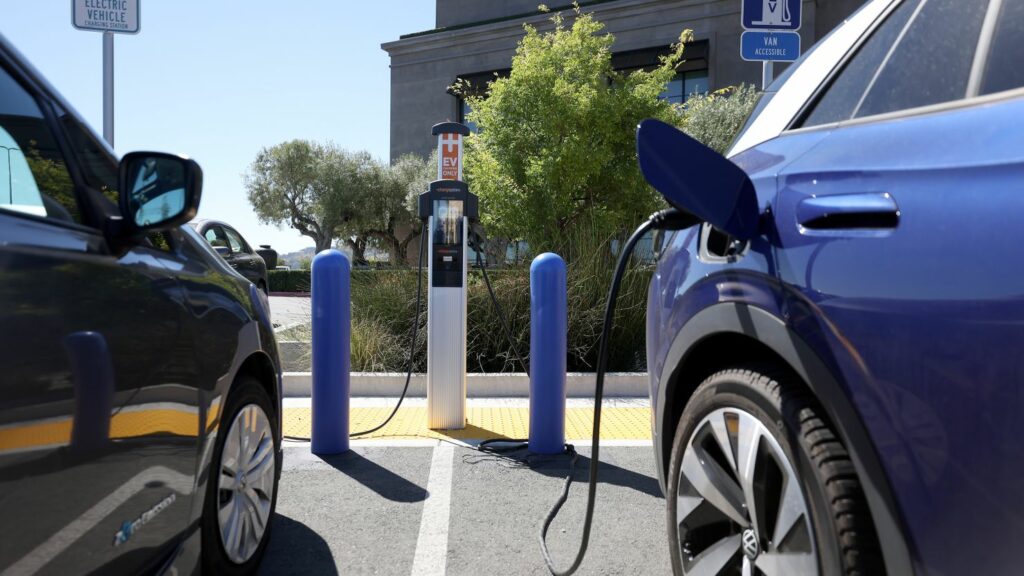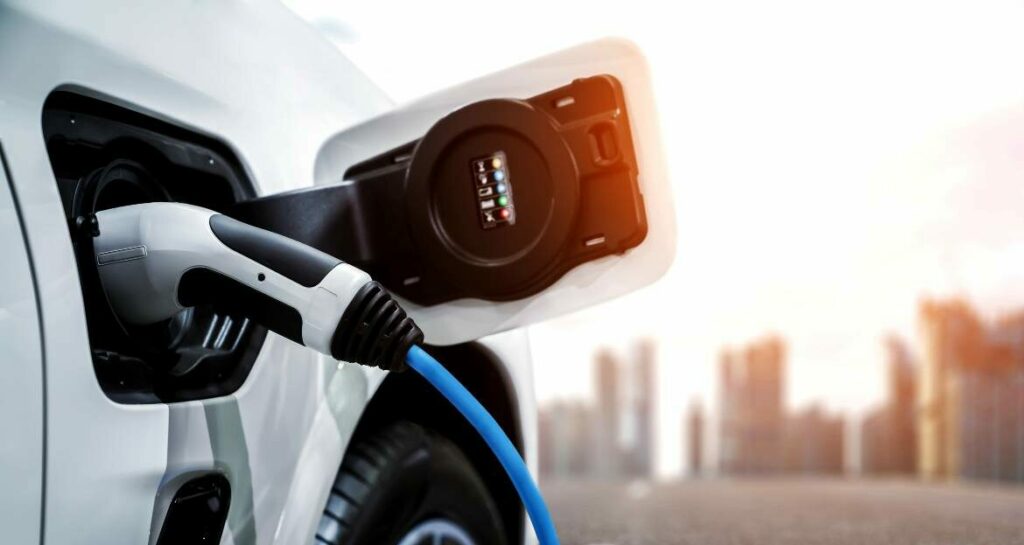Perhaps the climate debate needs fewer “climate scientists” and more engineers, a profession that specializes in trade-offs. Consider for instance the Telegraph headline “Electric car journeys could be restricted in Switzerland under plan to deal with energy shortages”. It started as an online rumour with a broken link. But it’s real. And it makes you wonder what people who think EVs are more energy-efficient than “ICE” (Internal Combustion Engine” cars) think that phrase means, or possibly could mean, if you have to ban them to save energy.
Possibly nothing at all. In Canada we recently discovered, courtesy of Blacklock’s Reporter, that our Environment Department decided to mandate all-electric cars by 2035 before doing, you know, homework on boring secondary points like whether they’re cost effective. And indeed, with a planet to save who has time for grubby citizens’ grubby preoccupation with not going broke?
Verdict first, trial afterward is SOP in echo chambers. But it’s still a bit of a surprise that:
“‘The department is seeking information on the current and projected total cost of light duty vehicle ownership in Canada,’ staff wrote in a notice to contractors. ‘The study will highlight the key lifetime cost differences between light duty vehicle market segments.’”
Not “might highlight”. It’s “will highlight” or no grant for you. Tell us what we want to hear because, the story goes on:
“New sales of gas and diesel cars would be abolished in 13 years. ‘The Government of Canada’s emissions reduction plan presents an ambitious and achievable road map to reach its emissions reduction targets,’ said the notice Total Cost Of Ownership For Light Duty Vehicles In Canada. ‘The government has established a mandatory target that 100 percent of car and passenger truck sales be zero emission by 2035 in Canada with interim targets of at least 20 percent by 2026 and 60 percent by 2030,’ wrote staff.”
We are repeatedly told that EVs are hugely popular; apparently with everyone except the public. We prefer the kind of poll conducted by a cash register to the kind where you can say just anything to feel virtuous. Blacklock’s adds:
“Few motorists drive electrics. Statistics Canada in a December 1 report Vehicle Registrations said of 24.1 million cars, SUVs, minivans and light duty trucks on the roads a total 551,654 were electric, about two percent.”
Of course when you’re figuring out “current and projected total cost” you’d better include EV batteries, which do wear out and need replacing and are a problem because of cost. And total unavailability.
Likewise, if you’re saving the planet, you need to figure out current and projected total environmental cost including the CO2 involved in manufacturing EVs and their batteries, plus petty things like disposing of them.
And another thing. Canary Media asks rather belligerently whose gonna charge all these cars? “Highway EV charging will need a ton of power – sooner than you think/ A new report warns that EV charging along Northeast highways will require sports-stadium levels of grid power by 2030. Where are the plans to supply it?”
Um nowhere, for obvious reasons. Yet instead of realizing they just highlighted a huge obstacle to the whole ban-the-gasoline-car frenzy, the piece has something of an “evacuate in our moment of triumph” feel, that it’s in the bag and all those delayers and deniers in various governments need to get with the program.
Which they already are, including on not knowing what efficient means. With the prospects looking this bleak, naturally Canada’s federal “Liberal” administration and the “Progressive Conservatives” in its most economically significant province of Ontario are teaming up to throw other people’s money into subsidizing corporations whose standard product line is unpopular so they can manufacture things consumers want even less. And Ontario’s power system is an unaffordable mess even without the (admittedly improbable) arrival of all these EVs at charging stations we don’t even have. As Parker Gallant notes, this conduct is old news here, to the tune of billions of dollars. And there’s also now a fantasy that with the encouragement of government a mythical set of new mines in northern Ontario dubbed the “Ring of Fire” will open up to produce minerals essential for EV manufacturing.
The Canary story outlines some very troubling American numbers including in a scary chart of the massive requirements involved. For instance “Annual Peak Demand” at a “Large Passenger/Truck Stop” would exceed that of “A Small Town” by more than half. Oh dear. Indeed:
“within the decade, demand for charging battery-powered cars and trucks at sites along highways will start to exceed the power draw of sports stadiums — and supplying that kind of power will require major interconnections to utility transmission grids. That’s the warning from a new report that finds there will be truly massive future power needs for EV charging in New York and Massachusetts, two states that have committed to selling only zero-emissions passenger cars by 2035 and moving to emissions-free trucks by 2045 and 2050, respectively.”
It’s equally bad in California, obviously. And the story then says, as though it were a minor detail, that:
“The new report – from RMI, clean transportation nonprofit Calstart, Northeast U.S. utility National Grid, and fleet-vehicle technology-services companies Geotab and Stable Auto – is one of the first of its kind to examine future charging needs with grid power availability in mind.”
The first? You mean you committed to this plan without doing basic due diligence on feasibility? Imagine ordering everyone to ditch their working car for a fancy new one and not making sure it can run. No wait. You don’t have to imagine. It’s what’s actually happening across North America.
The idea of electrifying the whole grid, especially if you’re going to supply it primarily with intermittent wind and solar, poses even more ghastly infrastructure problems, particularly the storage bottleneck on which the Manhattan Contrarian has done much valuable work and just published a major study. He warns that for Germany alone:
“fully replacing natural gas back-up with battery storage is a multi-trillion dollar project, likely costing a multiple of the country’s GDP, and thus completely infeasible. Realistically, Germany will never build any amount of storage that is meaningful relative to the scope of its problem.”
Even attempting it will, of course, they will bid up the price of batteries massively and enrich China, whose GHG output now exceeds that of the entire “developed” world if you believe China’s bleating claims still to be a Third World country.
As Terry Glavin complains in the National Post, Canada under our current Prime Minister’s father rejigged our foreign aid rules so China would qualify. And:
“China has used its ‘developing country’ pretensions to evade a variety of the multilateral environmental and climate change obligations that burden ‘First World’ countries…. the greenhouse gas output from Europe and North America have pretty much flatlined over the past quarter of a century, while China’s output has quadrupled.”
So, he adds, if you’re interested in that historic-output guilt thing:
“China has been at the forefront of assertions that it is the developed economies’ job to bear the greater costs of climate change mitigation, owing to the legacy of the Industrial Revolution… but... the volume of carbon dioxide China has pumped into the atmosphere over the past eight years exceeds the two-century output of the United Kingdom, where the Industrial Revolution began.”
Somewhere in this mess there must be competent engineers. But not, it would seem, in positions of authority.



I've seen numbers that suggest that we would need to triple or quadruple the existing grid capacity (and provide the required infrastructure) to replace all life-giving CO2 sources of energy to meet "net zero" goals (while maintaining current levels of prosperity). Globally, Copper production alone would have to replicate the volume produced over the last five thousand years within the next 22 years. Rare earth metals and battery metals require a similar effort. What is never discussed is the massive increases in fossil fuel consumption to achieve such monumental dreams. The only hope of approaching such goals would necessitate drastically increased reliance on hydro and more likely, nuclear projects. The non-ignorant elites behind such goals very likely understand these numeric limitations and I suspect have perhaps other goals which might not appeal that well to the Eloi. Perhaps that explains why in Canada these days, the only medical procedures without long waiting periods is assisted suicide.
Thank you for the column. This is a thought I have often had, where are the engineers in formulating these plans? Certainly engineers have been instrumental in innovations to market and improving energy efficiencies since the dawn of the industrial revolution. You also hit on consumeers are important in selecting products that make sense. So far EVs do not compete.
If you are content to charge at 7kW, then EVs can be charged everywhere, but in order to combat the two day charge time of the most capacious batteries, much of the local power distribution needs to be renewed. My house was built in 1913, and had both electric light and power, but expanding that to an electric shower eventually resulted in the main incoming fuse terminal burning out. The incoming cable was 'tri-axial', with 7 strands for the live phase, insulated with oiled paper, surrounded by 7 strands for the neutral, again insulated with oiled paper, then one inch wide wound steel tape, bathed in bitumen, for the earth connection. For any greater load than 7kW, a 3-phase supply is needed, necessitating the replacement of the existing cables with three times the amount of copper, which is both costly and inconvenient, digging up the road and cutting off the power for many hours.